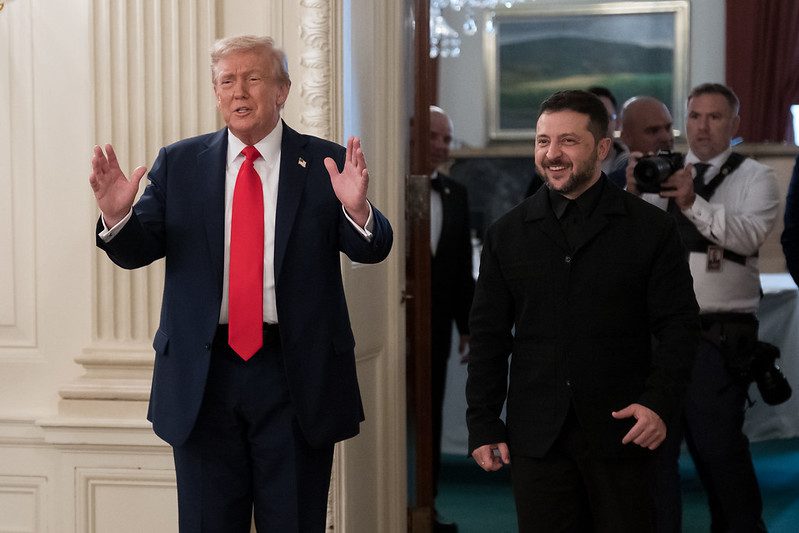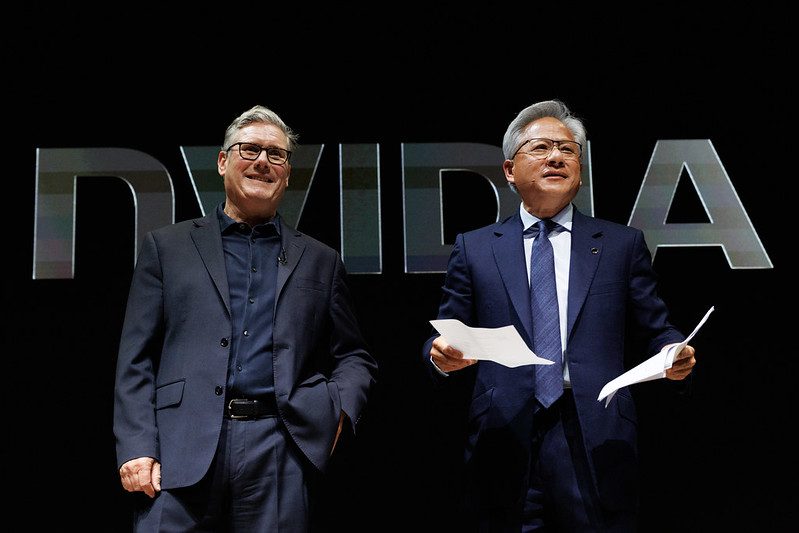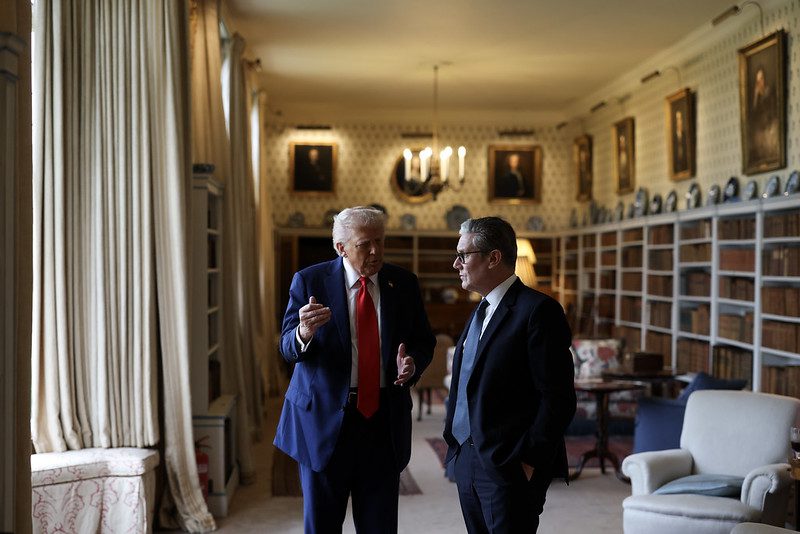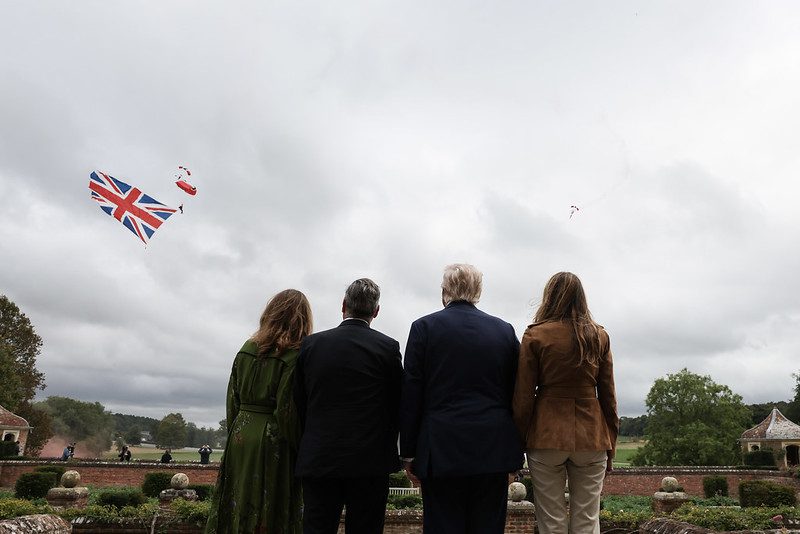The US President praised Keir Starmer’s negotiating skills, joking that the deals struck were better for the UK than for the US
Under the pomp and ceremony of US President Donald Trump’s historic second state visit lay pressure for Keir Starmer to shore up diplomatic ties between the UK and US.
From tech deals to tariffs, and financial deals to foreign affairs, the Prime Minister had a long list of agreements he needed to negotiate with Trump.
The leaders were keen to stress the strength of the special relationship in a joint press conference, with Starmer citing the countries’ “unique bond”, while Trump suggested: “we are forever friends”.
Indeed, the press conference went fairly smoothly – it was only when Trump was asked his opinion on Starmer’s decision to recognise Palestinian statehood that expected disagreement emerged.
Prior to the state visit, there was speculation as to whether Peter Mandelson’s recent dismissal as US Ambassador due to his ties to sex offender Jeffrey Epstein would cause awkwardness between the leaders, but the matter was brushed over. When questioned on the matter, Trump merely stated, “I don’t know him”, while Starmer reiterated the stance he has maintained over the past week.
While initial signs on Thursday may have indicated a successful visit, Trump’s comments as he left the country, criticising London Mayor Sadiq Khan and doubling down on the 25% steel tariffs he has imposed on the UK, indicate that relations between the UK and US are not wholly rosy. So the question remains, has Britain got what it needed from the US?
Ukraine
Trump and Starmer presented a united front in their condemnation of Russia, with the US President admitting that Putin had “really let [him] down”. Discussing other conflicts he has helped to resolve since he assumed office, he stated: “I feel I have an obligation to get it [the war in Ukraine] settled”. Given the UK’s attempts to make Trump see Putin as the biggest barrier to peace, this comment could be seen as a step in the right direction.

Image: President Donald Trump and President Volodymyr Zelenskyy of Ukraine – The White House – Andrea Hanks
While the PM was unsuccessful in getting Trump to commit to sanctioning Moscow, he did push for Western allies to stop buying Russian oil to force Putin into negotiations. In the EU, Hungary, Slovakia, France, the Netherlands, and Belgium are still purchasing oil from Russia. The US President was adamant that such purchases must stop: “I’m willing to do other things but not when the people that I’m fighting for are buying oil from Russia […] that’s not playing fair with the United States and we can’t have that”.
Recognising Palestine
The ongoing war in Gaza was predicted to be a flashpoint, with Trump stating that he and Starmer did have a “disagreement” on the matter. The British PM is set to recognise Palestine as a state in the coming days, for which he has previously been criticised by Trump, who warned that it would benefit Hamas.
However, the issue did not cause as much tension as some predicted with Starmer reiterating that Hamas could play “no part” in the future of a Palestinian state, for which the President gave him a pat on the back. Starmer also noted that the timing of his planned recognition of Palestine was unrelated to Trump’s state visit, but merely part of a wider “plan for peace”.
While it was always unlikely that the two leaders would come to a mutual agreement, the fact that Trump didn’t condemn Starmer outright could be seen as a sign of success for Downing Street.
Illegal migration
The State Visit took place against a backdrop of concern about the government’s migration policy after an Eritrean man successfully delayed his deportation flight on Wednesday. Yet the leaders seemed united in their determination to tackle illegal migration on both UK and US soil.
Starmer was keen to confirm that a successful ‘one-in one-out flight’ did take off on the morning of the press conference, calling it “an important step forward”, while Trump suggested the UK could deploy the military to secure borders, warning that illegal migration “destroys countries from within”.
Citing his own efforts to increase the US’s deportations of illegal immigrants, the President explained: “it doesn’t matter if you call out the military, it doesn’t matter what means you use”.
Tech partnership
One of the apparent successes to come out of the State Visit was the “Tech Prosperity Deal”, with tech giants Microsoft and Google pledging to invest billions in the UK. Microsoft will spend £22 billion in the UK over the next five years, while Google has pledged £5 billion in the coming two years, including expanding a data centre in Hertfordshire.

Image: Prime Minister Keir Starmer speaks with Jensen Huang, President and chief executive officer of Nvidia – No 10 Downing Street – Simon Dawson
The deal, described as “one of a kind” by President Trump, will see trans-Atlantic cooperation in areas such as AI and quantum computing. Tech company Amentum is planning to create over 3,000 jobs from Glasgow to Warrington and the Midlands, which should contribute to the government’s aim of diversifying employment opportunities throughout the country. In total, the investments are expected to create 7,600 new roles across the UK as a whole.
Starmer hailed the investments, saying they are “a testament to Britain’s economic strength and a bold signal that our country is open, ambitious, and ready to lead”. However, key political figures including former Deputy Prime Minister Nick Clegg have cast doubt on the deal, with Clegg telling BBC Radio 4’s Today Programme that the UK had to “stand more on our own two feet” to prevent a brain drain of UK start-ups moving across to the US.
Nuclear partnership
Just two days prior to the State Visit, the UK announced a “golden age of nuclear” with the signing of a US-UK deal on energy security. The deal includes building new nuclear power stations in both countries, with 12 advanced modular reactors planned to be built in Hartlepool.
The nuclear expansion has been hailed as an important step forward in the UK government’s aim to produce clean energy – a point of difference between the two leaders. While Starmer stated he would take a “pragmatic approach” which would see a mix of oil, gas, and renewables, Trump doubled down on his belief that “wind is a disaster”. Instead, he repeatedly told Starmer to “drill, baby, drill” in order to bring fuel prices down, encouraging the PM to make use of North Sea oil.
Notwithstanding this difference of opinion, the proposed deal should have mutual benefits for both the US and UK economies, with thousands of jobs set to be created across the country. The projects are expected to deliver over £51 billion in economic value to the UK, while a deal worth around £4 million will supply advanced HALEU fuel to the US.
Discussing the tech and nuclear deal, Starmer said it confirms “our status as the first partners in science and technology, ready to define this century together as we did the last”.
Steel tariffs
The UK faced disappointment in failing to eradicate the US’s 25% tariff on British steel exports. While this figure is better than the 50% levied on other countries, Starmer had proposed a deal which would see the tariff completely eliminated.

Image: Prime Minister Keir Starmer hosts Donald Trump for the state visit – No 10 Downing Street – Simon Dawson
Prior to boarding Air Force One, Trump did say that “they’d like to see if they could get a little bit better deal. So, we’ll talk to them”. However, it appears that such talks failed to successfully achieve the government’s “path to zero”.
Financial services
While Trump said that the UK and US are still in the process of finalising economic security deals, financial services have been boosted this week. Prior to the State Visit, over £1.25 billion in private US investments were announced, which are estimated to create 1,800 jobs.
PayPal, Citi Bank, Bank of America, and S&P Global are among the US firms putting money into the UK, with their investments set to benefit London, Manchester, Edinburgh, and Belfast.
During the State Visit itself, further investment was announced to boost a variety of areas including manufacturing and defence. Defence was a key talking point for Trump, who congratulated the UK on its commitment to spend 5% of GDP on defence earlier this year, saying he “look[s] forward to working even more closely with” the UK as a result. Starmer reiterated this, stating that “security remains the cornerstone of this special relationship” and that the two countries will continue to work together on new defence technologies.
The US economy will also benefit from the financial deal, with Starmer saying £250 billion will flow both ways across the Atlantic. Among the companies investing in the US are BP, which is planning to invest $5 billion each year over the next five years, and Revolut, which is set to invest over $500 million across the next three to five years.
Pharmaceuticals
UK pharmaceutical companies have faced difficulties in recent weeks, with many reducing investment in UK pharma, or transferring operations to the US. AstraZeneca recently halted its plans to spend £200 million expanding its Cambridge research facilities, while US pharmaceutical company Merck (or MSD) also scrapped its £1 billion research centre in London.
These difficulties were reinforced at the beginning of the state visit, when British pharmaceutical firm GSK pledged to invest $30 billion (£22 billion) in the US over the next five years. This is in comparison to the yearly £1.5 billion spent on UK research and development.
Part of the tech deal does, however, aim to boost the UK’s life sciences industry. US firm Prologis will invest £3.9 billion in the UK, part of which will expand the Cambridge Biomedical Campus, while new US-UK collaborations in AI aim to advance AI-powered healthcare solutions.
These deals should go some way to reducing the sting of the £2 billion loss the UK pharmaceutical industry has faced over the past year, but both recent trends and this tech deal suggest that UK pharmaceuticals are becoming increasingly dependent on the US.
Food, drink and agriculture
The majority of the economic deal seems to focus on tech and financial services, with little focus being given to agriculture. The industry has already faced difficulties after May’s deal with the US gave the UK market access to American bioethanol and beef.
Last month Vivergo, one of the UK’s two bioethanol plants, ceased production, laying off its 160 employees. US bioethanol had been described as “unfair competition” by UK producers, as it is classed as a waste byproduct in the UK unlike its domestically-produced counterpart.
While Trump did say in the press conference that the economic deal is still being finalised, perhaps suggesting more announcements are to come, for now, it seems that UK agriculture will have to continue competing against the US.
Conclusion
During Thursday’s press conference, Starmer noted the UK and US’s shared values of “freedom, democracy and the rule of law”, with Trump saying that “immortal bonds of affection and loyalty” unite the British and American people.
While UK agriculture and steel are still suffering, for the most part, it does seem that Starmer has successfully secured economic deals to shore up areas including defence, nuclear, and tech.
Flare-ups of flashpoints were avoided, and it appeared that – during the press conference at least – the two leaders were keen to present a united front, reiterating their determination to work together across economic and foreign policy.
Featured Image via No 10 Downing Street – Simon Dawson

